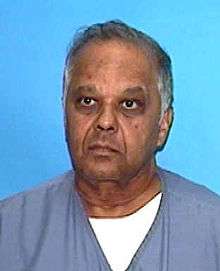Krishna Maharaj
| Krishna Maharaj | |
|---|---|
 Prison mug shot of Maharaj | |
| Born |
26 January 1939 San Fernando, Trinidad and Tobago |
| Occupation | Businessman |
| Criminal penalty | Life imprisonment |
| Criminal status | Incarcerated at South Florida Reception Center |
| Spouse(s) | Marita Maharaj |
| Parent(s) | Nanan Maharaj and Dolly Nanan Maharaj |
| Relatives | Ramesh Maharaj (brother) |
| Conviction(s) | First degree murder, kidnapping[1] |
Krishna Maharaj (born 26 January 1939) is a Trinidadian businessman. In 1987 he was convicted by a Florida court for the double murders of Chinese Jamaican businessmen Derrick Moo Young and Duane Moo Young, and was sentenced to death. Maharaj has always denied committing the murders, and according to the human rights organisation Reprieve, the case of Krishna Maharaj is "an epic miscarriage of justice".[2]
Family
Maharaj is the brother of Ramesh Maharaj, former Attorney General of Trinidad and Tobago. He is also the brother of Indra Rambachan (née Maharaj) who is the wife of National Award winner lawyer Roopnarine Rambachan.
Charge and detainment
According to the prosecution, Maharaj arranged a false meeting with Derrick Moo Young in the DuPont Plaza Hotel, in order to demand that Moo Young repay money that he had fraudulently taken from Maharaj's relatives in Trinidad. Derrick Moo Young turned up at room 1215 together with his son Duane. Once inside the room, Maharaj is said to have appeared with a gun from behind a door. An argument resulted, and the father, Derrick Moo Young, was shot to death by Maharaj. The prosecution stated that the son, Duane, then was taken upstairs in the suite and shot by Maharaj.
In 1997, a Florida court overturned the death sentence.[3] In 2001, almost 300 British politicians, church leaders and judges wrote a letter to the then Governor of Florida, Jeb Bush, asking for a retrial. The letter stated that there were 'astonishing flaws' in the case against Maharaj. Among those signing the letter were Lord Goldsmith, then Attorney General for England and Wales and Northern Ireland, Lynda Clark, then Advocate General for Scotland, Charles Kennedy, then Leader of the Liberal Democrats, Ken Livingstone, then Mayor of London, and Nicholas Lyell, former Attorney General for England and Wales and Northern Ireland.
The governor said no to a retrial, but instead Maharaj was re-sentenced to life imprisonment in 2002.[3]
In 2006, the British human rights organisation Reprieve made an appeal to Governor Jeb Bush for clemency on Maharaj's behalf, pointing out that the jury heard from none of Maharaj's alibi witnesses, who would have put him 25 miles away at the time of the murder; that the prosecution’s star witness changed his story several times; and that evidence has emerged since the trial that the murder victims were involved in money laundering and had links to drug traffickers, and that there are a number of alternative suspects with strong motives which were not considered at the time.[3] The appeal was denied.
In 2008, Reprieve made a second appeal for clemency to the then Governor of Florida, Charlie Crist, but this appeal was also denied.[2]
On 24 April 2014, judge William Thomas, from the 11th Judicial Circuit Court of Florida, Miami, approved that he would allow Maharaj's lawyer to present witnesses during an evidentiary hearing.[4][5]
14 November 2014: Henry Cuervo, a former US Drug Enforcement Administration Agent, told a court that ex-hitman Jhon Jairo Velásquez Vásquez had confessed to him that Escobar arranged the hit on the Moo Youngs. Cuervo said that Velásquez wanted to clear his conscience and had asked Cuervo to testify on his behalf. He also submitted an affidavit from Velásquez — a cartel assassin known as "Popeye" who was recently released from prison in Colombia, where he is reviled as one of the country's most infamous killers.[6]
On 4 April 2017, the 11th US circuit Court of Appeals granted a hearing based on evidence pointing to the involvement of Pablo Escobar’s Medellin cartel in the killings of which Maharaj is convicted. The court said that the additional witnesses had presented "compelling" accounts that "independently corroborate one another’s" and that "All five individuals’ stories reflect that the Moo Youngs were killed by the cartel.” [7]
References
- ↑ Florida Department of Corrections: Inmate Population Information Detail – Krishna Maharaj Retrieved 6 February 2010
- 1 2 Reprieve UK 5 June 2008: Plea for clemency denied by Governor Crist Retrieved 2012-07-09
- 1 2 3 Reprieve 13 October 2006: Mercy plea by innocent Brit imprisoned for 20 years in U.S. Retrieved 2012-07-09
- ↑ Ex-millionaire: I was framed for murders ordered by Escobar Retrieved 2014-12-11
- ↑ Judge to allow hearing for British citizen convicted in 1986 Miami double murder Retrieved 2014-12-11
- ↑ Luscombe, Richard (13 November 2014). "Briton Kris Maharaj 'framed' for Florida killings, claims Pablo Escobar's ex-hitman". The Guardian. Retrieved 13 July 2017.
- ↑ "Krishna Maharaj gets hearing after new claims surface in 1986 Miami murders". Associated Press, Miami. 4 April 2017. Retrieved 13 July 2017.
External links
- Lester Holloway, 3 June 2012: 25 years on, Krishna Maharaj’s extraordinary case will not be forgotten Retrieved 2012-07-09
- BBC News 28 March 2002: Millionaire Briton's 15 years on Death Row Retrieved 2012-07-09
- BBC Newsnight 9 August 2007: Miami Briton 'should be freed' Retrieved 2012-07-09